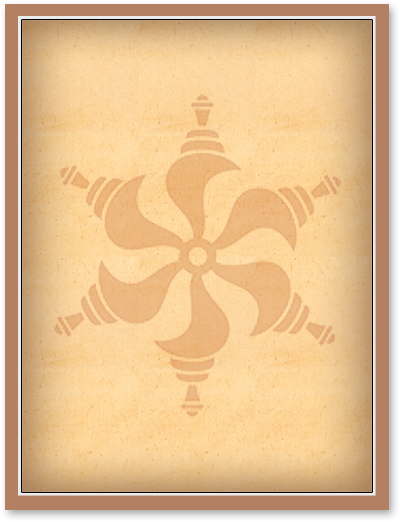

Jheenabhai was one such devotee of Shree Hari whose faith remained unfettered and firm under all conditions. Lord Krishna declared: “Those who have deepest faith in me are fully united with me.” He remained committed to Swaminarayan way of life and achieved the spiritual goals it offered.
His father Manubha owned two villages – Panchala and Jamnawad which he had received as a royal gift. The land–revenue, though fluctuating due to unpredictable monsoon was more than enough for spending on religious and philanthropic activities. It was under such cultural and religious atmosphere that his two sons, Jheenabhai and Gagabhai were born and brought up.
Manubha was afollower of Ramanand Swami. Once when Shree Hari was blessing Jheenabhai said: “You will undertake great religious activities and your name will be immortal as a saintly devotee.” After the death of Manubha, Jheenabhai managed the land with the help of his brother, his nephew and his own son. Harmony and happiness prevailed in the family. Jheenabhai used to serve the saints whenever they came to his house. Jheenabhai led a very simple frugal life and spent all his savings in serving the poor, the saints, devotees and friends. Occasionally he organized religious festivals on a grand scale.
During the famine in Samvat 1869 which was the worst in the history of India, Jheenabai remain unaffected. On the instruction of his beloved Shree Hari he had disposed of his cattle and horses in the previous year and had cornered fodder and food grains on a large scale to fight the famine successfully.
Even during the famine he continued his religious acts of charity. He maintained a number of saints at his house, fed the poor and sold food grains at subsidized price to others. Even then he made a net profit of 35000 cowris, not a small amount. He spent all this money on religious festivals next year and on feeding the poor and the saints.
Serving the sick and old is a natural duty of any religious follower. Even Shree Hari has spoken about this in His holy book Shikshapatri and on several occasions stated in His religious discourse about an incident in which He nursed a seriously sick and helpless sadhu in the jungle.Jheenabhai proved to be the best illustration of this command. When Karamsibhai, a great devotee was seriously sick he needed medical treatment. Jheenabhai wanted to bring him to his house. So Karamsibhai had to be carried on a cot and Jheenabhai was among the men who carried him. He served him personally till he fully recovered.
Adiba, the sister of Jheenabhai, refused to give pepper which was required for treatmentand made some excuse for it. When Jheenabhai later on learnt the truth he snapped all relations with her for six months. He also served Vanza a very poor sick devotee in the same manner.
The years that followed the famine brought good monsoons and this added to the prosperity of Jheenabhai greatly. He planned to celebrate the religious festivals on a grand scale. Initially Shree Hari declined to attend it but later participated.
Provisional residential accommodation for innumerable invitees was made and sumptuous dinners for many days were served to the participants. On the full-moon night the theater community dance Raas was organized in which Shree Rampratapji the elder brother of Shree Hari played the drum and Shree Hari Himself danced with the devotees till late night. The devotees wanted to dance with Shree Hari till the dawn. So to distract the devotees Brahmanand Swami set fire to some hay at a distance and made his colleagues shout,’ Fire.’ Next day Holi was celebrated on a grand scale during which the special dish of Shelam (mixture of cooked rice, molasses and ghee) was served to all including the tribal.
Jheenabhai took good care of Shree Rampratapji when he stayed there. 12 pounds of food consisting of butter, ghee bread sugar and milk was served to him on daily basis.
Jheenabhai donated all his vast land in the city of Junagadh for construction of a temple. A majestic temple was built on this under the supervision of Swami Brahmanand in Samvat 1884. Shree Hari mentioned him as a great devotee saint during his religious discourse (Vachanamrit 24 Godhada Last).
When Jheenabhai died Shree Hari assured his old mother that Jheenabhai had gone to Akshardham-the divine abode of God.As a mark of His deep love for him Shree Hari Himself was one of the four undertakers of his cortege, an honor that Shree Hari didn’t offer to His own brother Ichchharamji when he died.